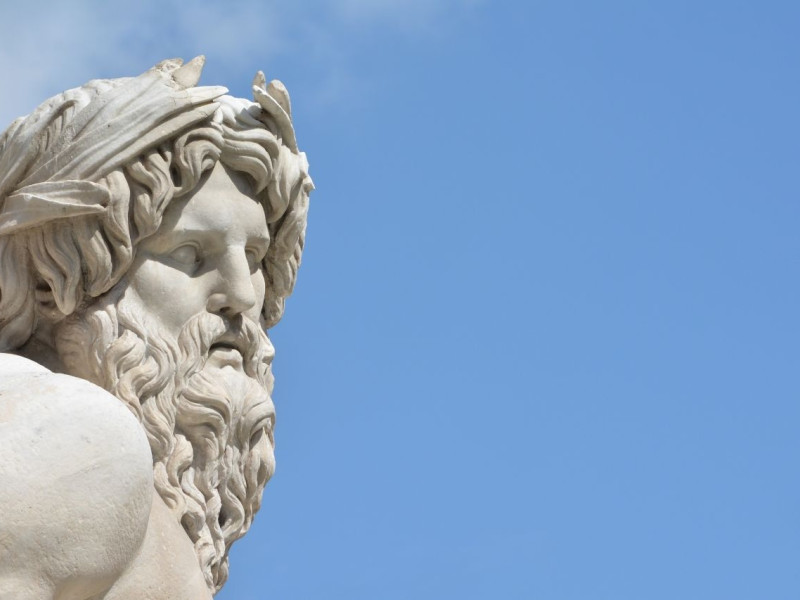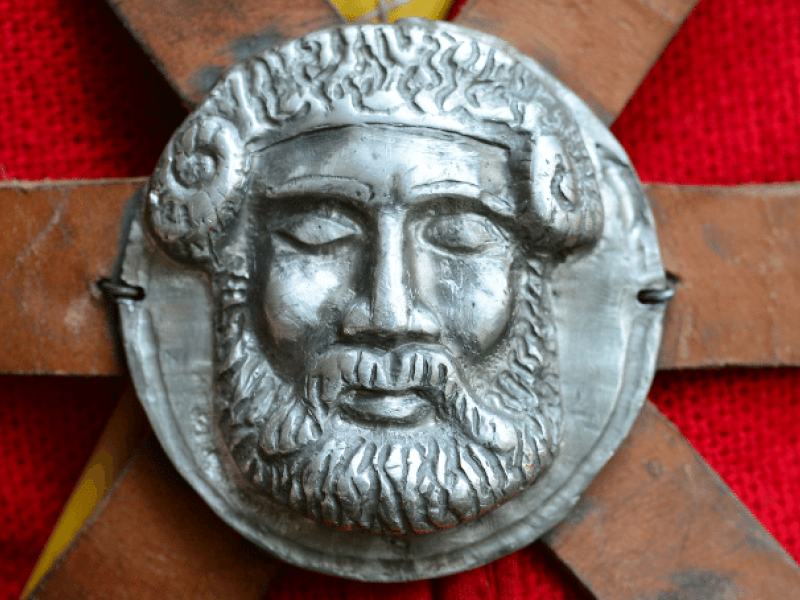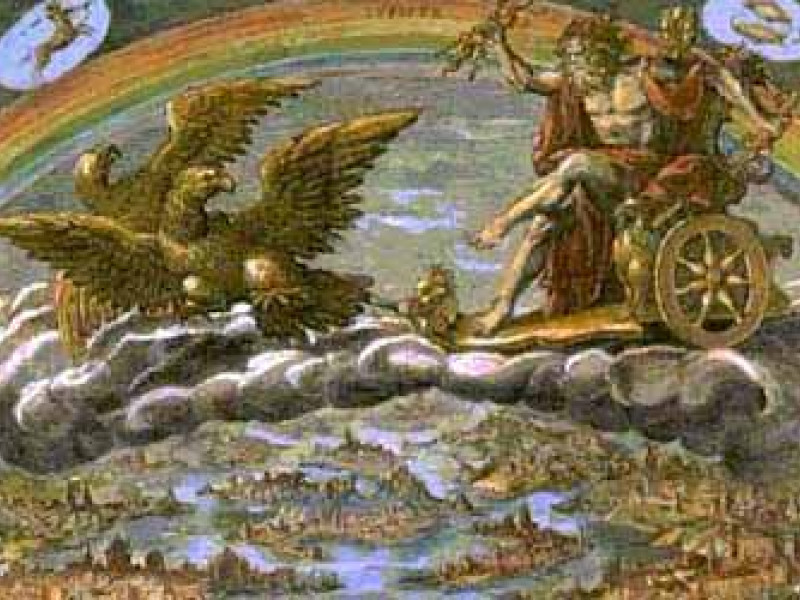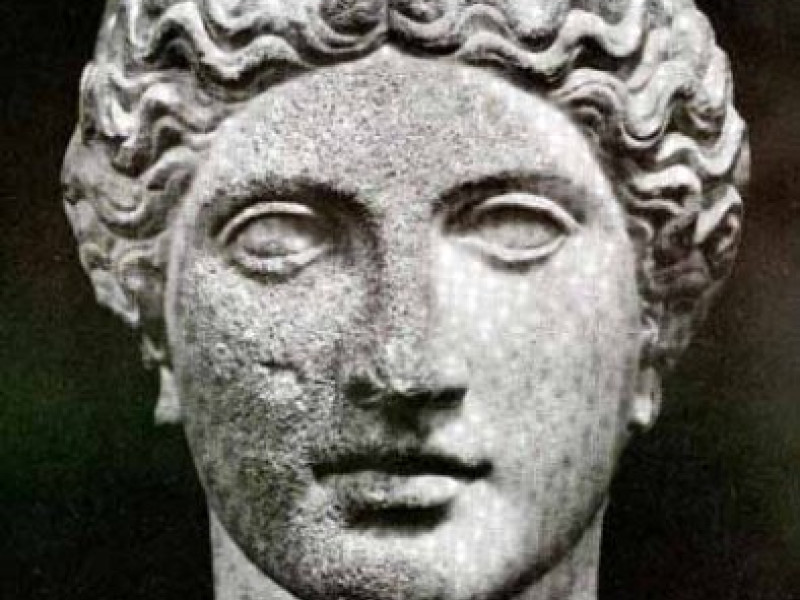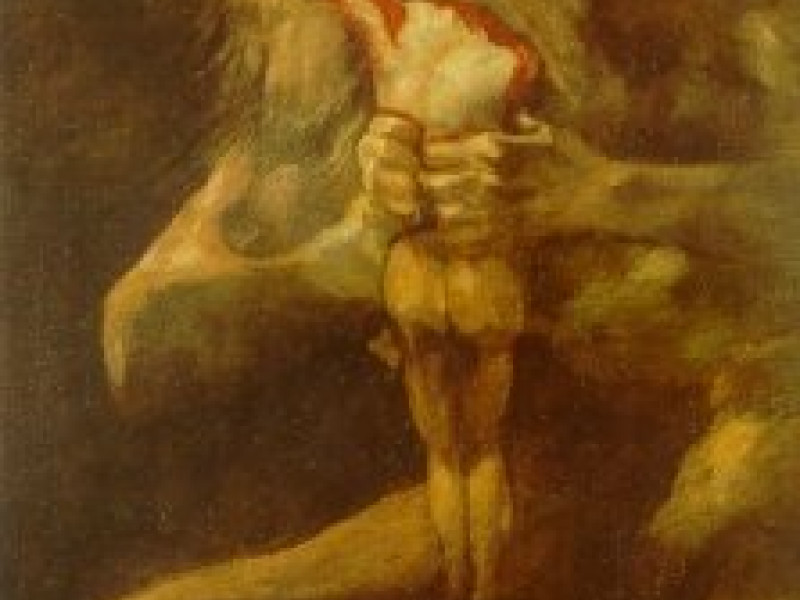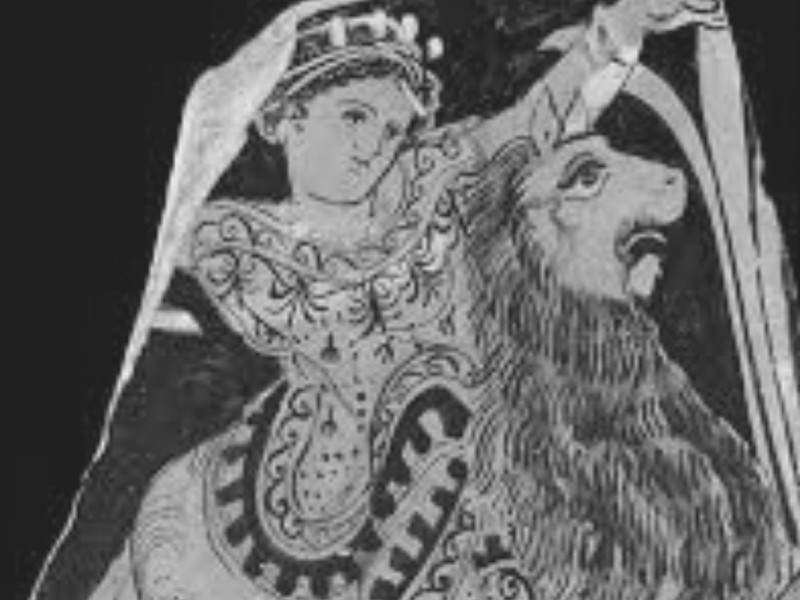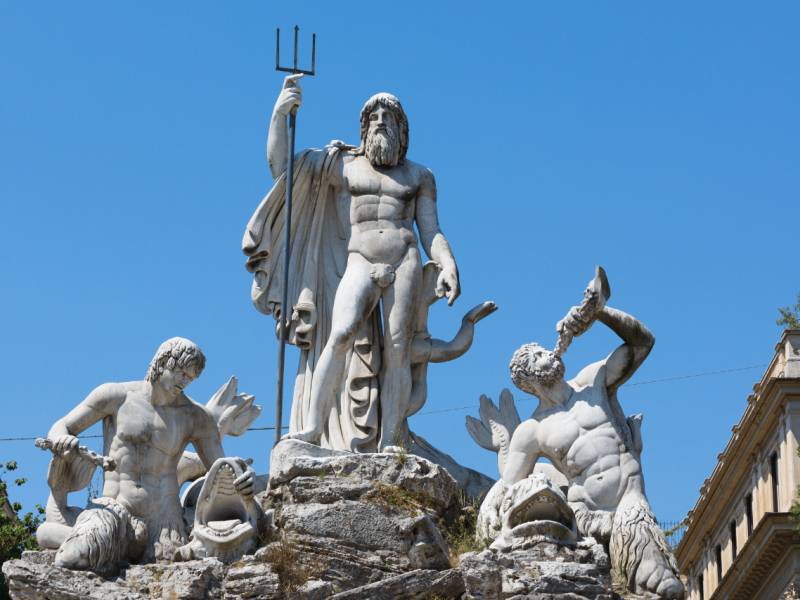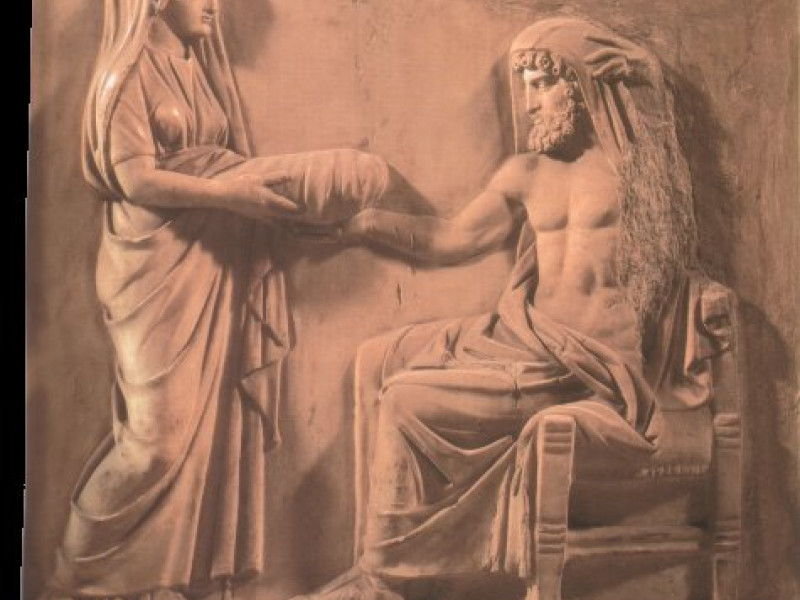Zeus (Jupiter)
Supreme ruler of the gods and lord of the sky. The son of the titans Cronus and Rhea, he was known to the Romans as Jupiter or Jove.
Zeus was the brother of Hestia, Poseidon, Hades, Demeter and Hera. Zeus was the youngest among his siblings.
Zeus' brothers and sisters were devoured by their father because of the prophecy that Cronus would lose his power from one of his sons. Zeus was born either in Arcadia or Crete. He escaped from being swallowed by his father because his mother Rhea gave Cronus a stone wrapped in swaddling cloth to devour, instead of him. The infant Zeus was hidden in a cave at either Mount Dicte or Mount Ida in Crete, where he was brought up by the mountain nymphs and fed by a goat named Amalthea. To drown out the infant's crying, the Curetes danced about, clashing their spears loudly against their shields. When he reached adulthood, Zeus freed his siblings when he caused Cronus to disgorge his children, after drinking emetic.
Aided by his brothers Poseidon and Hades, he overthrew his father Cronus as king of the gods, and imprisoned him and the other male Titans who opposed him in Tartarus. When they decided to divide the world between themselves to rule, Zeus received the sky, controlling the clouds, rain and storm. The three ruled the earth and Olympus together, but Zeus was soon acknowledged as the supreme lord of gods and men. He was also the most powerful of the gods because he wielded the thunderbolts, which the Cyclopes had created for him in the war against the Titans. (See Creation.)
Zeus had three wives. After hearing Gaea's warning about having a son who would one day displace him, Zeus swallowed his first wife Metis to prevent this prophecy from happening. Metis was already pregnant at that time, so when it was time for Metis to deliver a child, Athena sprang out of Zeus' split open head, fully armed.
His second wife was the Titaness Themis who was the mother of the Seasons and possibly the Fates (Moerae).
By his sister and consort Hera, he was the father of Ares, Hebe and Eileithyia. Some say he was father of Hephaestus, though most people accepted the stories that Hera bore Hephaestus by herself, without a father. His other possible children were Eris, goddess of discord and strife, and Enyo, the goddess of war; mainly because both goddesses were often called Ares' sisters.
He had numerous affairs with goddesses, nymphs and mortal women. By the Titaness Leto he became the father of Apollo and Artemis. The Pleiad named Maia, bore him a son called Hermes. According to some writers, he was the father of Aphrodite by Dione, who was possibly the daughter of Oceanus and Tethys. He was therefore possibly the father of all of the younger Olympian gods.
Through his other sister Demeter, he was the father of Persephone. Another important god was Dionysus or Bacchus, conceived when he seduced the Theban princess named Semele, daughter of Cadmus and Harmonia.
According to the Orphic myth, after he was born, Rhea changed her name to Demeter. Zeus raped his mother (Rhea/Demeter), and she gave birth to Persephone. Later, Zeus would rape his own daughter so that Persephone gave birth to the elder Dionysus, otherwise known as Zagreus, but the Titans killed the infant (Dionysus). Zeus seduced Semele, and he became father of a second Dionysus (Bacchus). See Orphic Creation.
Zeus had many affairs with mortal women, and he was the father of many children. Some of these children became rulers of powerful kingdoms, while others were great heroes. There are too many to list here, but here are a few famous names.
Zeus had an affair with Io, daughter of the river god Inachus. In the form of a bull, he carried Europa away to the island of Crete, where he became father of Minos, Rhadamanthys (Rhadamanthus) and Sarpedon. Zeus transformed himself into a shower of gold to seduce Danaë (Danae) while her father imprisoned her in a tower. Danaë bore him the hero Perseus. Zeus also seduced Alcmene in her husband's form, and became the father of Heracles.
While in Sparta, he ravished Leda in the form of a swan and became father of Polydeuces and Helen. (Another version says that it was Nemesis who was the mother of Helen. Zeus ravished the goddess Nemesis in the form of a swan. Nemesis laid an egg that Leda would find, and Leda raised Helen as if she were her own daughter.)
He had many epithets: Basileus (king), Mechaneus (manager and contriver), Moiragete (guide of the Moirae), Meilichios, Panhellenius, Soter (saviour), and Terminalis (protector of boundaries). Places of worship were Arcadia, Crete, Dodona, and Rhodes. His favourite animal was the eagle, symbolising kingly power; his favourite tree was the oak, symbol of strength. Olive trees were also sacred to him. He had a chariot that was pulled by winged horses which he used to pursue the monstrous spawn of Gaea, Typhon.
In Athens, the Diasia was a festival sacred to Zeus which was held in late February or early March. The Olympic Games were held in his honour every four years at Olympia, in Elis. The first Olympiad was traditionally dated to 776 BC. The games involved athletic contests and chariot races.
Related Information
Name
Zeus, Ζεύς – "Sky Father" (Greek).
DI-WO (Minoan); DI-WE, DI-WI-JE-U (Mycenaean);
DI-WI-JA Diwia (Minoan and Mycenaean; feminine form for Zeus, possibly Dione?).
Brimos (Phrygian).
Jupiter, Jove (Roman).
Tin, Tinia, Tinis (Etruscan).
Ammon (Egyptian).
Festivals
Olympic Games.
Sources
The Iliad and the Odyssey were written by Homer.
Theogony and Works and Days were written by Hesiod.
Catalogues of Women was possibly written by Hesiod.
Homeric Hymns.
Library and Epitome were written by Apollodorus.
Metamorphoses was written by Ovid.
Fabulae and Poetica Astronomica were written by Hyginus.
Prometheus' Bound was written by Aeschylus.
Hymns was written by Callimachus.
There are too many other references to Zeus, to be listed here.
By Jimmy Joe

